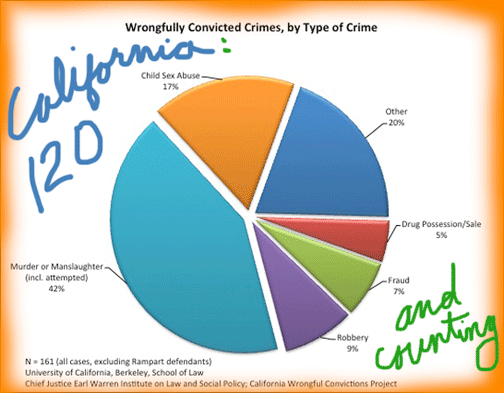INMATE LAWSUITS COST CALIF. $200 MILLION A YEAR (AND THAT’S BEFORE YOU GET TO THE COUNTY AND CITY LAWSUITS)
The AP’s Don Thompson did the math on how much inmate lawsuits cost the state.
Here’s a clip:
Gov. Jerry Brown has begun aggressively challenging federal court oversight of California’s prison system by highlighting what he says is a costly conflict of interest: The private law firms representing inmates and the judges’ own hand-picked authorities benefit financially by keeping the cases alive
How much are they making?
A tally by The Associated Press, compiled from three state agencies, shows California taxpayers have spent $182 million for inmates’ attorneys and court-appointed authorities over the past 15 years. The payments cover a dozen lawsuits filed over the treatment of state prisoners, parolees and incarcerated juveniles, some of which have been settled.
The total exceeds $200 million when the state’s own legal costs are added.
While the amounts are a blip on California’s budget, they provide a continuous income stream for the private attorneys and experts involved in the ongoing litigation. And that is the point Brown is trying to make.
By highlighting what he says is a costly conflict of interest: The private law firms representing inmates and the judges’ own hand-picked authorities benefit financially by keeping the cases alive.
There’s a lot more—about the costs ofthe court receiver’s office that has been overseeing the state’s prison health system since it was killing people so regularly that it was put in federal receivership.
The attorneys make the case that nonprofit lawfirms in particular are not exactly doing the work for the money.
Yet there is also a case to be made that consciously or not, some of the consultants, “special masters” and attorneys working for the court-appointed authorities, all of whom are taking hefty personal fees and/or salaries, may be fiscally disincentivized from calling a halt to such fee-producing endeavors as the CDCR’s seemingly neverending receivership.
As the AP noted:
In his budget address last month, Brown said the money that would be saved by ending court oversight in the mental health and health care cases could be spent instead on inmate education, substance abuse treatment and other rehabilitation programs, as well as to supervise convicts once they leave prison.
Excellent point. Let’s hope it comes to pass.
Of course, the cynical person might point out that, ideally, the state would behave in such a way that it didn’t open the door to giant lawsuits and federal receiverships.
But that’s another conversation altogether.
PS: Here’s the breakdown of dollar amounts that went to individual law firms, et al
TEXAS HANDS OUT $65 MILLION FOR WRONGFUL CONVICTIONS….AND COUNTING
Texas leads the nation in money paid to exonerees—in part because it compensates wrongly convicted people more than most other states. But also because Texas convicts a lot of innocent people. Mike Ward at the Austin Statesman has the story.
Here’s a clip:
For a state perhaps best known as the leader in executing murderers, Texas now has another distinction: It is the most generous in compensating those who were wrongly locked up.
In all, the state has paid more than $65 million to 89 wrongfully convicted people since 1992, according to updated state figures.
And if legislation being discussed at the Texas Capitol becomes law, that tab could soon grow.“The justice system in Texas had fundamental flaws, and this is the result,” said state Sen. Rodney Ellis, a longtime champion of the falsely imprisoned. “At this point, I don’t think anyone can seriously doubt that we had a problem — a big problem.”
For a hint of how off-track Texas’ justice system once was, and how expensive those mistakes have become for taxpayers, consider the case of Michael Morton, the exonerated former Austin-area resident who served 25 years in prison for a murder he didn’t commit. A Williamson County court convicted him in 1987 of killing his wife Christine.
Morton, who was 57 when he was freed from prison in 2011, so far has received $1.96 million for his mistaken imprisonment, state records show.
Under a law signed by Gov. Rick Perry in 2009, some exonerees will receive $80,000 each year for the rest of their lives and are eligible for the same health insurance as employees of the Texas Department of Criminal Justice, where the ex-prisoners did their time.
AND WHILE WE’RE ON THE TOPIC, CALIFORNIA LEADS THE NATION IN EXONEREES WITH 120 SINCE 1989, AT A COST OF $129 MILLION
According to the Wrongful Convictions Project at UC Berkeley, as of Sept 2012, California is the winner of the wrongly convicted sweepstakes. We lead the nation in exonerees (counted after 1989), with 120 individuals in the National Registry of Exonerations, zooming past Illinois (110), Texas (100), and New York (100).
It is, by the way, sobering to note that 53 of those wrongful convictions were overturned because of the Rampart scandal.
Note: The National Registry requires a post-conviction showing of new evidence for inclusion.
(By the way, just in my personal circle, I have two friends—Franky Carillo and Mario Rocha, both excellent men who were exonerated after having been given life sentences.)
In addition to the costs to individuals and their families of life lost behind bars, according to the Wrongful Conviction Project, the direct costs of incarcerating and compensating our wrongly convicted Californians so far totals $129 million.
EDITOR’S NOTE: Light posting today because I’m fluish (or whatever this stupid cold/flu thing is that’s come and gone and come again this winter. Also, I figure you’re getting plenty of Dorner news elsewhere, at least for today. And WitnessLA generally doesn’t cover the Pope—except to say that, like many, we find it very irritating that Mahoney gets to vote on the Papal selection.

